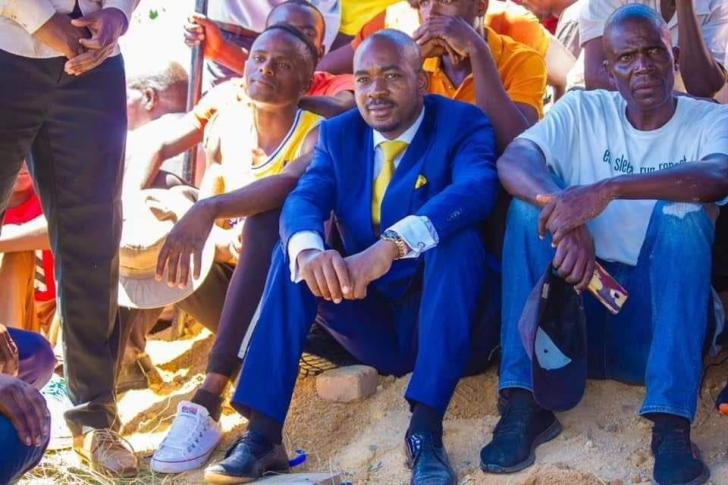News / National
Chamisa says Unity Day has lost its lustre
23 Dec 2024 at 05:55hrs |
0 Views

Opposition leader Nelson Chamisa has sharply criticized the current political environment in Zimbabwe, saying that the promise of a united nation has been sacrificed on the altar of "toxic politics." He argued that these divisions have deepened the gap between the "haves" and "have-nots," preventing the country from achieving true unity and prosperity.
Chamisa's remarks were made in commemoration of National Unity Day, a public holiday observed every December 22 in Zimbabwe. The day marks the historic merger between ZANU-PF and PF-ZAPU in 1987, following years of ethnic and political violence, which culminated in the massacres known as Gukurahundi. The violence, which claimed the lives of around 20,000 people between 1983 and 1987, led to a peace agreement signed by ZANU leader Robert Mugabe and ZAPU's Joshua Nkomo. The Unity Accord formed a single nationalist political party under the name Zimbabwe African National Union Patriotic Front (ZANU-PF), with the goal of bringing peace and national reconciliation.
National Unity Day has been a public holiday since 1997, a day to reflect on Zimbabwe's journey toward peace and healing. However, Chamisa, leader of the opposition Citizens Coalition for Change (CCC), believes that the promise of unity has not been fulfilled in the years since the Unity Accord.
"Unity Day reminds us of all the elusive promise of a united and prosperous Zimbabwe," Chamisa said. "A promise that has been broken by bad governance, toxicity, inequality, mistrust, and injustice. True unity is not about the unity of political parties or individuals. It is about unity of all citizens, founded on shared values and mutual ideals built on love, peace, and shared prosperity."
Chamisa emphasized that genuine national unity must go beyond symbolic gestures or one-day observances. He argued that unity should be a lived experience, practiced daily in every aspect of life, and not just a political slogan or a ceremonial occasion.
"In the coming Zimbabwe, there will be new and genuine unity, powered by love and mutual respect, where every Zimbabwean is proud to belong, and their dignity is protected and well treasured," Chamisa said.
The opposition leader also reiterated his commitment to these values should he assume leadership, underscoring his vision for a nation where unity is reflected in the daily lives of citizens. He called for an end to the toxic political climate and divisive policies that, in his view, have contributed to a divided and unequal society.
Chamisa's remarks come at a time when Zimbabwe's political climate is increasingly polarized, with deepening divides between the ruling ZANU-PF party and opposition groups. As the nation reflects on the legacy of the Unity Accord, Chamisa's call for true, inclusive unity resonates with many Zimbabweans who feel that political and economic challenges continue to impede the realization of the country's potential.
National Unity Day, which was initially meant to symbolize the healing of the nation's divisions, has become a reminder of the work still needed to achieve true reconciliation and national unity in Zimbabwe. Chamisa's comments signal his continued focus on the need for a more inclusive, peaceful, and prosperous future for all Zimbabweans.
Chamisa's remarks were made in commemoration of National Unity Day, a public holiday observed every December 22 in Zimbabwe. The day marks the historic merger between ZANU-PF and PF-ZAPU in 1987, following years of ethnic and political violence, which culminated in the massacres known as Gukurahundi. The violence, which claimed the lives of around 20,000 people between 1983 and 1987, led to a peace agreement signed by ZANU leader Robert Mugabe and ZAPU's Joshua Nkomo. The Unity Accord formed a single nationalist political party under the name Zimbabwe African National Union Patriotic Front (ZANU-PF), with the goal of bringing peace and national reconciliation.
National Unity Day has been a public holiday since 1997, a day to reflect on Zimbabwe's journey toward peace and healing. However, Chamisa, leader of the opposition Citizens Coalition for Change (CCC), believes that the promise of unity has not been fulfilled in the years since the Unity Accord.
"Unity Day reminds us of all the elusive promise of a united and prosperous Zimbabwe," Chamisa said. "A promise that has been broken by bad governance, toxicity, inequality, mistrust, and injustice. True unity is not about the unity of political parties or individuals. It is about unity of all citizens, founded on shared values and mutual ideals built on love, peace, and shared prosperity."
Chamisa emphasized that genuine national unity must go beyond symbolic gestures or one-day observances. He argued that unity should be a lived experience, practiced daily in every aspect of life, and not just a political slogan or a ceremonial occasion.
"In the coming Zimbabwe, there will be new and genuine unity, powered by love and mutual respect, where every Zimbabwean is proud to belong, and their dignity is protected and well treasured," Chamisa said.
The opposition leader also reiterated his commitment to these values should he assume leadership, underscoring his vision for a nation where unity is reflected in the daily lives of citizens. He called for an end to the toxic political climate and divisive policies that, in his view, have contributed to a divided and unequal society.
Chamisa's remarks come at a time when Zimbabwe's political climate is increasingly polarized, with deepening divides between the ruling ZANU-PF party and opposition groups. As the nation reflects on the legacy of the Unity Accord, Chamisa's call for true, inclusive unity resonates with many Zimbabweans who feel that political and economic challenges continue to impede the realization of the country's potential.
National Unity Day, which was initially meant to symbolize the healing of the nation's divisions, has become a reminder of the work still needed to achieve true reconciliation and national unity in Zimbabwe. Chamisa's comments signal his continued focus on the need for a more inclusive, peaceful, and prosperous future for all Zimbabweans.
Source - NewZimbabwe
Join the discussion
Loading comments…





































